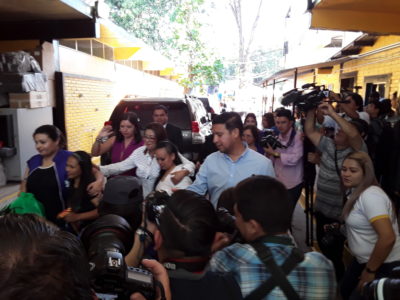 “I feel very happy …” said Alba Lorena Rodríguez, one of the three women released on March 6 by the authorities of El Salvador after spending years in jail accused of aborting. She spoke through tears and joy, as she prepared to leave the women’s prison, just hours before International Women’s Day.
“I feel very happy …” said Alba Lorena Rodríguez, one of the three women released on March 6 by the authorities of El Salvador after spending years in jail accused of aborting. She spoke through tears and joy, as she prepared to leave the women’s prison, just hours before International Women’s Day.
Rodríguez, like María del Tránsito Orellana and Cinthia Marcela Rodríguez–the other two who also regained their freedom–suffered complications that led to the death of her baby during deliveries. Their cases were handled as abortions and they were sentenced to prison sentences of between 30 and 40 years for homicide.
The women were released on Thursday, in compliance with an order from the Salvadoran Supreme Court of Justice. According to this resolution, these women were paying “disproportionate and immoral” penalties.
The court that approved the release of the women, also indicated that the three, “have lived in inadequate social, economic and family conditions” and that their families were negatively affected by their sentences, because “the economic contribution of these women is fundamental” for them.
The Minister of Security, Mauricio Ramírez Landaverde, shared the opinion of the Supreme Court and added that when the women were convicted, the justice system did not take into account important circumstances, such as the lack of access to the medical system, at the time of issuing its verdict. Most cases such as these involve women of limited resources, with little access to education and health and from rural parts of the country.
“The fundamental reason are criteria of justice and morals. We share the criterion of the Supreme Court of Justice, because the particular situations of total vulnerability were not taken into account when evaluating and establishing the sentence to which these women were sentenced, “said the Salvadoran official.
Morena Herrera of the Citizens’ Association for the Decriminalization of Abortion, an organization that accompanies cases of women convicted of abortion, welcomed the decision of the Salvadoran authorities.
“A woman who is suspected of aborting is condemned immediately, because in the country this signaling is enough for Salvadorans to abandon the presumption of innocence. Women come to the judicial system with the stigma of aborting and the Prosecutor’s Office accuses them of aggravated homicide, “explained Herrera.
According to data from the Herrera’s organization, from 2009 to date, 33 women, convicted of abortion in cases similar to those of these three women, regained their freedom and another 20 are still in prison for unjust sentences like these. “We will continue in the struggle so that we do not have women in prison because of an unjust law that violates their rights,” the feminist emphasized.
The liberation of the women came after mobilization by grassroots feminist organizations moved the Supreme Court to endorse their release. Moreover, the women complied with the requirements of good behavior, participating in programs of social reintegration and activities to learn a trade.
“I used to lock myself up so I would not have problems, I worked on good behavior and participated in the I Can Change programs, that’s what I dedicated myself to learning for nine years. I was in a problem-solving course and that helped me a lot to maintain myself,” said Lorena Rodríguez, before crossing the prison threshhold to regain her freedom.
Outside the women’s prison, close to the capital of San Salvador, relatives and friends of the three waited with tears in their eyes and smiles of expectation. The three have spent between 11 and nine years behind bars for what many consider an unjust condemnation. “They are free, they are free, some are still locked up, but today these three are free”, they cheered.
The cases of these women sentenced for abortion are mostly impoverished women from rural El Salvador. When they arrive at the hospitals of the Salvadoran public health system, they are treated as possible cases of induced abortion, even in cases of miscarriage and are usually condemned by public opinion before reaching the justice system.
In El Salvador, abortion is punishable by eight and ten years in prison. Last year, the right-wing party proposed modifying the sentences for up to 50 years. Meanwhile and without sufficient support, the leftist party called for the elimination of criminal punishment for abortion in cases of rape or statutory rape.
In the last 10 years, some 28 poor women in rural parts of the country who suffered complications in the last weeks of their pregnancy and who also had out-of-hospital deliveries were sentenced to up to 40 years in prison for homicide.
The freeing of the three women represents a great victory for them and for feminist and human rights organizations.



